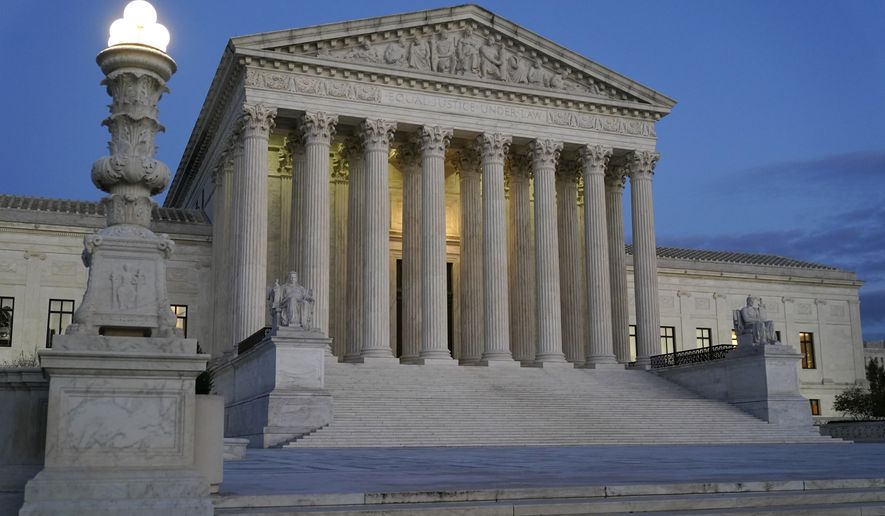The Supreme Court’s upcoming case on who holds the final say on election rules would be largely confined to the pages of law review journals and backrooms of state legislatures in any other era, but in the era of Trump, the case has taken on melodramatic proportions with liberal activists warning that nothing short of American democracy is at stake.
Legal scholars are more circumspect, though some echo the activists’ warnings that American elections could look markedly different if the justices side with North Carolina legislators and rule that state assemblies, not state courts, have the final say in how elections are conducted.
“This case is about checks and balances. What kind of world is it where state legislators can do whatever they want when it comes to elections?” said Neal Katyal, an acting solicitor general in the Obama administration who will argue against the North Carolina lawmakers. “What these folks are asking for is extraordinary, and it would totally change the way elections are done.
“It ain’t American democracy,” he said.
The case grew out of a dispute over North Carolina’s congressional district map drawn after the 2020 census.
A state court struck down the map drawn by the Republican-controlled legislature as an illegal partisan gerrymander and imposed its own map.
SEE ALSO: Republicans criticize Trump’s call to suspend Constitution in wake of Twitter revelations
Republican lawmakers said that ran afoul of the Constitution’s elections clause, which reads: “The Times, Places and Manner of holding Elections for Senators and Representatives, shall be prescribed in each State by the Legislature thereof; but the Congress may at any time by Law make or alter such Regulations, except as to the Places of chusing Senators.”
The Republican lawmakers say that language means state assemblies set final rules that state courts can’t override.
Opponents say that would upend the way elections are conducted — indeed, repeatedly in 2020, when state courts and sometimes state administrative officials rewrote laws to expand voting access during the COVID-19 pandemic.
The Pennsylvania Supreme Court ordered new deadlines for receiving mail-in ballots. The Georgia secretary of state, responding to a lawsuit, adopted new rules for validating absentee ballots.
Although neither of those changes is part of the case before the justices, they hint at what is at stake in the case over North Carolina’s congressional districts.
After state Republican lawmakers lost in lower courts, they begged the Supreme Court to intervene and put the court-drawn congressional map on hold. The high court rejected that request earlier this year but sped the case onto its docket.
Several of the justices dissented. They said the Republican lawmakers’ claims had merit and their request for a stay should have been granted.
“We will have to resolve this question sooner or later, and the sooner we do so, the better,” wrote Justice Samuel A. Alito Jr., joined by Justices Clarence Thomas and Neil M. Gorsuch.
Justice Alito said that taking the elections clause at face value, “there must be some limit on the authority of state courts to countermand actions taken by state legislatures when they are prescribing rules for the conduct of federal elections.”
On the other side stands the Biden administration, which joined liberal election groups and North Carolina officials in defending the state’s actions and urging the high court to leave things be.
Solicitor General Elizabeth Prelogar said a state’s usual checks and balances should apply, and that usually means state courts have the right to step in and overturn a legislative decision when it is illegal or unconstitutional.
Besides, the opponents said, North Carolina’s legislature has explicitly granted its state courts the power to review congressional maps. Even if the lawmakers are correct that the assembly has the final say, it has fairly delegated that power to the courts.
Common Cause, the elections watchdog group Mr. Katyal is representing in the case, said a ruling in favor of the Republican lawmakers would give assemblies carte blanche to dictate how elections play out.
“As a matter of text, structure, history, precedent, and long-established practice in this country, that is flatly wrong. The U.S. Constitution does not grant impunity to a state legislature for violations of its state constitution simply because the legislation relates to congressional elections,” the group argued in its brief.
Jason Snead, executive director of the Honest Elections Project, dismissed the “threat to democracy” rhetoric and said the real problem in 2020 was the use of lawsuits in state courts to try to change election practices for a “partisan political objective.”
“This is a case very fundamentally about what the elections clause says and which organ of state government is responsible for setting the rules for governing an election,” Mr. Snead said. “This attempt to use state courts to rewrite election laws for partisan advantage, that is not something we want to continue to see.”
• Stephen Dinan can be reached at sdinan@washingtontimes.com.
• Alex Swoyer can be reached at aswoyer@washingtontimes.com.




Please read our comment policy before commenting.